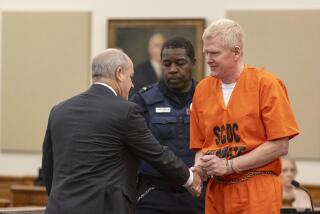Judge Tosses Out Three Counts Against McDougal
The judge presiding over the Susan McDougal embezzlement trial jettisoned three of 12 felony counts Thursday, as well as an allegation that she stole more than $150,000 from her former employers, conductor Zubin Mehta and his wife, Nancy.
Saying the charges were “not supported by the evidence,” Superior Court Judge Leslie W. Light tossed out counts involving McDougal’s application for, and use of, a credit card in her and Nancy Mehta’s names. And he lowered the amount McDougal is accused of taking from the Mehtas to $50,000.
“The penal code is not designed to take a given situation and see how many felonies can be spun out of it,” Light told Deputy Dist. Atty. Jeffrey Semow, who argued that he had tallied McDougal’s alleged take from the Mehtas at $161,141.
Light said he had not seen convincing evidence to support that figure and granted defense attorney Mark Geragos’ request to dismiss the three counts and the “excessive taking” allegation.
The prosecutor showed little reaction to Light’s ruling, which came at the end of nine contentious weeks of testimony.
McDougal was not in court when the judge ruled, but defense attorney Geragos seemed buoyed by the decision, which in effect trimmed three years from a possible seven-year prison sentence.
Laurie Levenson, an associate dean at Loyola Law School, said the judge’s move was not unexpected, given that he has expressed doubts about the prosecution’s ability to prove a theft in excess of $150,000.
“This will help focus the jury on what really matters,” added Levenson, who often comments on high-profile cases. “Susan McDougal is still facing the heart of the case, and that’s what the jury should be focusing on. The judge is helping them do that.”
The predominantly female jury still must decide nine other counts--one grand theft, two credit card fraud, three forgery and three state tax evasion counts. McDougal is accused of signing Nancy Mehta’s name to checks and credit card receipts to obtain cash and merchandise. And she is charged with failing to file state income tax returns for the years she worked for the Mehtas--1990 through 1992.
The judge found that “no reasonable juror” could conclude from the testimony that McDougal made false financial statements by posing as Nancy Mehta while applying for a credit card in both their names, or that she had used the card after it was canceled as the prosecution initially had alleged.
As the judge has indicated throughout the trial, the key issue jurors must decide is whether they believe Susan McDougal or Nancy Mehta on whether Mehta had authorized McDougal to take out the joint credit card and sign her name to checks and receipts.
He told jurors late Thursday that to convict McDougal of the theft, forgery and fraud counts, they must find she intended to defraud the Mehtas.
In another instruction, the judge said jurors could find McDougal guilty only if they found that her alleged crimes were committed after Oct. 19, 1990--the date the statute of limitations tolled. The jury is supposed to acquit McDougal if they find that the Mehtas, acting with reasonable diligence, should have discovered the alleged thefts before then.
The jury will begin deliberations, possibly as early as today, after the attorneys deliver their closing arguments.
More to Read
Sign up for Essential California
The most important California stories and recommendations in your inbox every morning.
You may occasionally receive promotional content from the Los Angeles Times.









